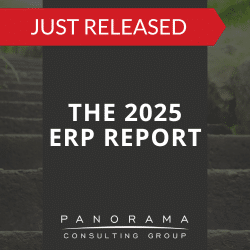Breach of contract. Fraud. Operational Delays. Drama. None of these are words an organization wants to hear in the midst of their digital transformation. Unfortunately, organizations often find fault with their ERP vendor, value-added reseller or consultant. The reverse situation – a vendor filing suit against a client – is also common. In this blog, we hope to provide a unique perspective on the causes of ERP failure and lawsuits. We also will provide some wizardly advice should you find yourself walking the same path.
“I think there’s more to this Hobbit than meets the eye.”
According to our 2016 ERP Report, about seven-percent of organizations experience ERP failure and another 36-percent are unsure if their project was a success or failure. The report finds no meaningful correlation between ERP vendor selected and rate of failure. However, there was a correlation between failure rate and lack of project planning, misaligned expectations and inadequate focus on business process reengineering and organizational change management.
How to Write a Tragedy
There’s quite a few ways that organizations can ensure ERP failure:
Not Investing Enough Time in ERP Software Selection
If you select enterprise software that is a mismatch for your organization, it’s going to make success difficult.
Not Reading or Understanding Contracts with ERP Vendors
If you don’t understand what you’re getting yourself into, you might overlook the importance of planning, especially when it comes to resources and staffing.
Not Defining Business Requirements and Workflows
You can’t rely on the software to define your business processes. Define your current and future state processes first so you can maintain your organization’s competitive advantage and maximize benefits realization.
Too Much Customization
If you over-customize your ERP system, you may incur unexpected costs in the form of maintenance and upgrades.
Poor Organizational Change Management
If your project plan doesn’t include specifics on communication, training and organizational readiness, it’s never too late to revise it.
Lack of Executive Sponsorship
If you’re not reviewing your project with executives on at least a bi-monthly basis, your initiative may begin to suffer from a lack of vision as well as end-user resistance.
How to Re-Write a Tragedy
Many ERP failures regain traction well before organizations have a chance to consider litigation; and most ERP lawsuits end up settling well before the trial date. But, since ERP Expert Witness work is somewhat of an interesting adventure, here’s a quick anecdote from our past experience:
One day, an organization felt that their implementation partner didn’t deliver on what was promised. The organization engaged Panorama to analyze the feasibility of a lawsuit and determine if legal action was worth pursuing. So the Expert Witness team analyzed documentation, developed reports and provided deposition and testimony. By identifying mistakes that diverted from best practices, the team assigned fault to the implementation partner, and the organization recovered thousands of dollars in consulting fees.
We hope you never need Panorama’s ERP Expert Witness Services. That’s why we are always sharing advice and best practices. If you do find yourself writing an ERP tragedy, your project is absolutely recoverable. By following the above advice, you can rewrite your story to ensure that your digital transformation reads less like a series of unfortunate events and more like a grand adventure.
“I thought up an ending for my book. ‘And he lives happily ever after, till the end of his days.’”













